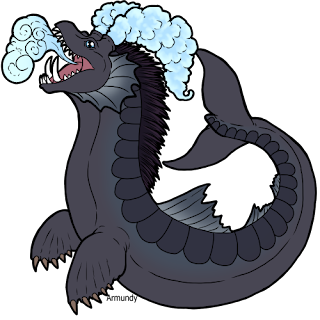Physeter
In the medieval era and earlier, so little was know about whales that they were regarded in the same manner as dragons and sea serpents. Today physeter, meaning blower or whirlpool, is the genus name of sperm whales. And while the name always referred this species of whale, what was believed about their appearance and behavior was worthy of being called a mythical beast.
The earliest surviving accounts of physeter was from Pliny the Elder. He states that it was the largest beast in the Sea of Gaul, today known as the North Atlantic. According to Pliny the physeter would rise itself up in a column above the masts of ships and spray out water from its head in a fountain like torrent.
The physeter was often found in medieval bestiaries, where it was described as a giant fish with a horse like head and neck. It's head had two spouts from which it could spray out water. A horse like mane ran down the back of its neck. Often the depiction would end here, with the body hidden beneath the waves. Otherwise the body was believed to be snake like.
The physeter was believed to be inherently cruel and malicious, searching out ships and sinking them for sport. It's hide was so thick that ordinary weapons couldn't piece it. There were however other ways to ward it off. Trumpets and cannon fire were used to scare off the whale. It could also be distracted by throwing barrels and row boats into the water.
Olaus Magnus described the physeter in 1555. He describes it has having a round lamprey like mouth which can suck in water and blow it back out as a weapon against ships. As well as having a long snake like tail that can curl around ships. Olaus's physeter was black in color and being 200 cubits long (350 feet or 100 meters).
Around the same time, the physeter also features in Francois Rabelais's epic Gargantua and Pantagruel. There physeter is shown rearing up above the masts of ships and filling them with it's water spray. The characters of the book compared physeter to Leviathan. Although the characters of the book were heroically able to kill the physeter, in spite of it being known for having an impenetrable hide else where.




Comments
Post a Comment